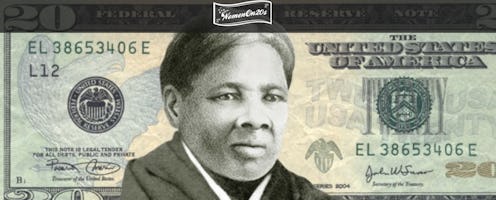News
Why Harriet Tubman Deserves To Be On The $20 Bill

The next time you go to the ATM looking for some Jacksons, you may just receive some Tubmans in return. Several months ago, the group Women on 20s launched its campaign to (literally) change the face of the $20 bill from former President Andrew Jackson to one of America's most famous women, ranging from Susan B. Anthony to Shirley Chisholm. As of Tuesday, the results are in: former slave-turned-abolitionist and suffragist Harriet Tubman will be the first woman on the $20 bill. Well, not quite yet.
After opening up voting to the public in March, Women on 20s narrowed its $20-bill candidate field from 15 American women to just the final — or should we say, "fierce" — four: Tubman, civil rights activist Rosa Parks, former first lady and humanitarian Eleanor Roosevelt, and Cherokee Nation's first female chief, Wilma Mankiller. Tubman won with roughly 33 percent of the vote, just beating out Roosevelt.
But the process isn't over yet — after all, kicking a former president off a piece of American currency is not that easy. Now, Women on 20s will have to send a petition with at least 100,000 signatures to President Obama, requesting him to direct Secretary of the Treasury Jack Lew to place Tubman on the $20 bill. Sorry, Jackson.
Women on 20s has noted that Obama has expressed in the past his desire to see more women represented on U.S. currency, so the group is hopeful that someday, maybe — just maybe — we'll see a woman gracing the $20 bill. That woman may not end up being Tubman, but we think the voters have chosen wisely. Here's why we think Harriet Tubman deserves the $20 spot, and why we're calling our bills Tubmans from now on...
She Was Fearless
It's well-known that Tubman was one of the leaders of the Underground Railroad, making a total of 19 trips between the free North and the enslaved South. According to historians, Tubman helped roughly 300 people escape from slavery, utilizing a network of safe houses and covert paths. She reportedly gained the nickname "Moses" during her frequent trips to Maryland, from where she led African-Americans born or sold into slavery to freedom.
But before Tubman could lead people to freedom, she had to free herself. Born into slavery, Tubman didn't become a free woman until 1849, when she escaped from her master's home in Dorchester County, Maryland. Tubman traveled, on foot, to Pennsylvania — an 100-mile trip that may have taken her weeks to make.
While speaking at a convention in 1896, Tubman reflected on her role in the Underground Railroad by saying: "I was the conductor of the Underground Railroad for eight years, and I can say what most conductors can’t say — I never ran my train off the track and I never lost a passenger."
She Was Defiant
One of the most famous stories about Tubman actually comes from her childhood, when she first witnessed what happened to men and women who tried to escape from slavery. As a 12-year-old girl, Tubman was reportedly ordered to tie up a fugitive slave who was caught attempting to flee north. According to the National Women's History Museum, Tubman refused, and was consequently attacked by her slave master, resulting in a head injury.
Historians believe Tubman suffered from the effects of this head injury for the rest of her life. But this incident was possibly her earliest show of defiance and the root of her abolitionist work.
She Was The First Black Woman In The U.S. Military
Because of her knowledge of the hidden trails between the North and the South — particularly of the Mid-Atlantic states that straddled the Mason-Dixon line — Tubman was recruited by the Union Army during the Civil War. Essentially, she acted as a spy, going into Southern towns to gather covert intelligence on the movements of the Confederate Army.
Tubman also led expeditions of Union soldiers, including the famous Combahee River expedition, and soldiers frequently referred to the abolitionist-turned-military spy as "General Tubman." She is believed to be the first black woman to serve in the U.S. military (though Cathay Williams, who enlisted in the army in 1866, is sometimes given that distinctions).
When Tubman was buried, she was given military honors. However, she was denied a military pension in her old age despite her valuable and undisputed service during the Civil War.
She Stood Up For All Women
After the Civil War, Tubman turned her attention to women's suffrage, a burgeoning movement of mostly white women. Tubman provided much-needed insight as a speaker, highlighting the lack of rights for women of color. She was determined to see equal rights among all people — man, woman, white, black — and spoke frequently about the dangerous injustices of slavery and socioeconomic inequality.
Images: screenshot/Women On 20s, Wikimedia Commons (2)